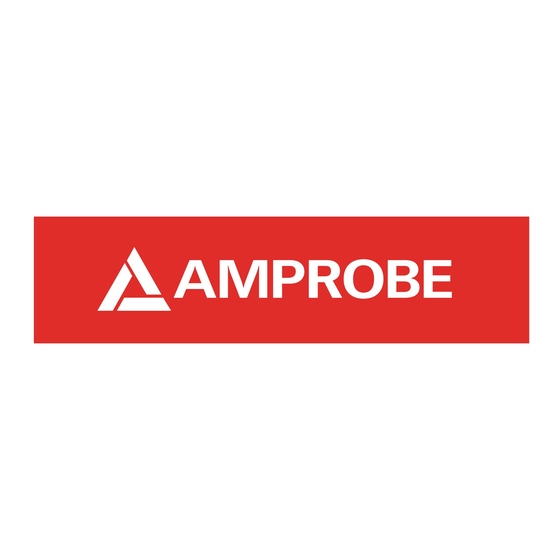Subscribe to Our Youtube Channel
Summary of Contents for Amprobe ULD-410
- Page 1 ULD-400 Ultrasonic Leak Detector ULD-410 ULD-420 User Manual 10/2019, 6012544 A ©2019 Amprobe. All rights reserved. 1.888.610.7664 www.calcert.com sales@calcert.com...
- Page 2 Limited Warranty and Limitation of Liability Your Amprobe product will be free from defects in material and workmanship for one year from the date of purchase unless local laws require otherwise. This warranty does not cover fuses, disposable batteries or damage from accident, neglect, misuse, alteration, contamination, or abnormal conditions of operation or handling.
-
Page 3: Table Of Contents
ULD-400 Ultrasonic Leak Detector CONTENTS 1. PRECAUTIONS AND SAFETY MEASURES ............. 2. INTRODUCTION ..................... 3. KIT COMPONENTS ....................3.1 Kit Components ......................4 3.2 ULD-400-R Receiver .......................5 3.3 ULD-400-T Transmitter ....................6 3.4 Accessories ........................7 4. MAIN APPLICATIONS .................... 4.1 Using the ULD-400-R Ultrasonic Leak Detector Receiver ..........8 4.2 Using the ULD-400-T Ultrasonic Leak Detector Transmitter ........10 5. -
Page 4: Precautions And Safety Measures
1. PRECAUTIONS AND SAFETY MEASURES SYMBOLS Caution! Refer to the explanation in this manual. � Consult user documentation. Battery. Complies with European Directives. Conforms to relevant South Korean EMC Standards. Electromagnetic Compatibility: Korea (KCC): Class A Equipment (Industrial Broadcasting & Communication Equipment) This product meets requirements for industrial (Class A) electromagnetic wave equipment and the seller or user should take notice of it. -
Page 5: Introduction
2. INTRODUCTION Ultrasonic sound, or ultrasound, is a sound wave with frequencies above 20 kHz, higher than the upper audible limit of human hearing. Ultrasound can be generated when turbulence created by air or gas is forced through a small orifice. Leaking air or gas is generally considered to be viscous flow, and as the flow velocity increases, the frequency of the ultrasound emitted becomes higher. -
Page 6: Kit Components
3. KIT COMPONENTS 3.1 Kit Components Your shipping box should include: ULD-410 ULD-420 ULD-400-R Receiver ULD-400-T Transmitter Headphones Earbuds (for use with hard hat) PB-1 Power Parabola TEA-1 Flexible Tubing Adapter TE-1 Tubular Extension CC-ULD-400 Hard Carrying Case AA Batteries (Receiver) -
Page 7: Uld-400-R Receiver
3. KIT COMPONENTS 3.2 ULD-400-R Receiver Microphone sensor Sound Battery volume status Headphone Volume "+/-" button Signal Sensitivity Signal strength filter level indication Auto Filter button Sensitivity “+/-” button Headphone jack On/Off button Figure 3.2: ULD-400-R Receiver 1.888.610.7664 www.calcert.com sales@calcert.com... -
Page 8: Uld-400-T Transmitter
3. KIT COMPONENTS 3.3 ULD-400-T Transmitter The ULD-400-T Transmitter is included with the ULD-420 kit and is optional for the ULD-410 kit. When a leak is not pressurized sufficiently the Receiver will not be able to detect it. In these circumstances, the ULD-400-T Transmitter can be used to emit an ultrasonic sound that the Receiver can read. -
Page 9: Accessories
3. KIT COMPONENTS 3.4 Accessories The ULD-400 comes supplied with additional Receiver accessories that are helpful in leak identification. Plug the headphones into the Receiver to audibly hear the leak and verify its source (for example hissing sound of an air leak versus ticking sound of an electric discharge). -
Page 10: Main Applications
4. MAIN APPLICATIONS 4.1 Using the ULD-400-R Ultrasonic Leak Detector Receiver 1. Turn on the Receiver and plug the headphones into the jack located on the front of the Receiver. Any standard set of 3.5 mm jack headphones are compatible. 2. - Page 11 4. MAIN APPLICATIONS *ULD-400-R Filter Operation In some situations, there might be strong ultrasonic noise generated by running machinery, motion sensors or other equipment. This noise will cause the Receiver to read the maximum signal strength on the display regardless of the sensitivity settings and make it unusable for detecting leaks. In such cases, press the “Filter”...
-
Page 12: Using The Uld-400-T Ultrasonic Leak Detector Transmitter
4. MAIN APPLICATIONS 4.2 Using the ULD-400-T Ultrasonic Leak Detector Transmitter The Transmitter allows for ultrasonic detection of openings in locations where there is no gas or air pressure, or the pressure is not sufficient to detect the leak with the Receiver alone. Typical applications include verifying tightness or pinpointing places of air, water or gas leaks in: •... -
Page 13: Maintenance
5. MAINTENANCE 5.1 Changing the Receiver Batteries The ULD-400-R uses four 1.5 V AA (LR6) batteries (supplied). To replace the batteries, follow these steps: 1. Make sure that the Receiver is turned off. 2. Use a screw driver to unscrew the captive screw. 3. -
Page 14: Changing The Transmitter Batteries
5. MAINTENANCE 5.2 Changing the Transmitter Batteries The ULD-400-T uses two 1.5 V AAA (LR03) batteries (supplied with ULD-420). To replace the batteries, follow these steps: 1. Make sure that the Transmitter is turned off. 2. Loosen the battery-door lock with a flat screwdriver. 3. -
Page 15: Specifications
6. SPECIFICATIONS Features ULD-400-R ULD-400-T Sensitivity Adjustment Volume Adjustment Signal Level Adjustment Earphone Jack (compatible with 3.5 mm audio jack) Display Size LCD 2.5 in (6.35 cm) Display Dimensions 1.45 x 1.93 in (36.72 x 48.96 mm) Display Resolution 240(RGB) x 320 pixels Display Type TFT-LCD (262 K) Display Color...







Need help?
Do you have a question about the ULD-410 and is the answer not in the manual?
Questions and answers